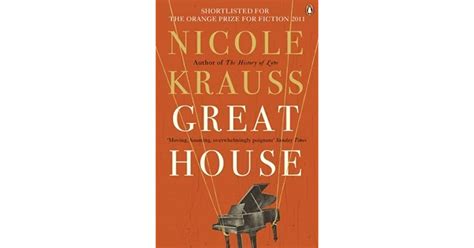Great House – Reflected, Refracted, Refined
Nicole Krauss is an immensely talented novelist, a writer with a passion for language and exceptional skill. She does not so narrate so much as paint with words; the flow of her language is poetic. Yet her narrative is not unduly performative. Krauss writes stories that have a relationship with their audience.

In 2010, she published Great House, her third novel. The book received critical acclaim, awards, and cemented Krauss’s reputation as a top-tier author. It is a carefully crafted work, a jewel box of five different narratives and primary characters that, over time, come into focus, offering high-level understanding and meaning. The threads running through are historical (the violence of government against its people), philosophical, emotional, and interpersonal. There are recurring questions of identity, of remembering (and forgetting), and the presence of a much-traveled desk. Each of the key characters are struggling with loss. That may sound complicated, but it’s not unduly complex in Krauss’s hands. I was aware, while reading it, of her direction, structure and choice. There’s nothing sloppy or untethered in the book.
All of that is on the positive side of the ledger and good reason for the novel’s critical successes. And yet – and I’ve been wrestling with the “and yet” – I cannot assert that the novel moved me emotionally. I admire it and find much to praise – and I yet can’t state that it has stayed with me.
It might be because Krauss does not strike me as fully invested with her characters in this effort. I’m not sure, though; there are more than a few novelists whose work moves and whose relationship with their characters is at arm’s lengthy. George Elliott is a fine example, a brilliant novelist whose characters are sometimes less than fully realized.
My emotional distance from The Great House also might be that characters’ traits and internal dialogue are often seem to drive the novel more than plotting or action. It is a book of thoughts and feelings in different cities and over time. However, there are again many outstanding novels that are light on action. Then again, I was wondering if my coldness might be the absence, save the horrors of a Pinochet or Holocaust, of every day life’s concerns in the book. The characters, sketched in particular situations, sometimes struck me as transcendent or any one time or place.
Or it simply might be the wrong novel at the wrong time for me.
That thought – the right piece of literature for the right reader and the right time – has been bouncing around in my head for months. Reading in the pandemic is not, for me, like reading was two years ago. Reading in late 2020 has a different sense of urgency to it, a charged sense of relevance. One must choose to read and engage in a text, and when we can’t go outside, when the daily news brings new stresses and horrors, simply reading a novel is a weighted act of choice. It is consequential. That does not mean that everything that I read now has to be “important.” Goodness knows I crave escape fiction, too. Great House is not a diverting fluff. It it is serious and reflective. All that said, it was not substantial to me in a way that resonated.
Maybe – after covid, after the sheltering, when it’s possible to read a book in public or while traveling, I’ll have a different reception to Great House. For now – you’re welcome to borrow my copy.
David Potash